Jun 05, 2025
Rethinking Global Finance: Alumni Perspectives on Debt-for-Climate Swaps
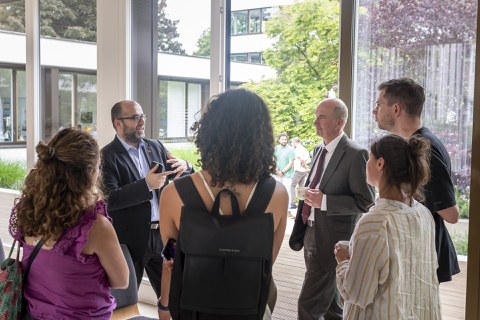
The lively exchange continues during the break.
Alumni engagement is not only about staying in touch—it’s about shaping the future together.
With global debt distress and climate impacts escalating, new forms of cooperation and financial innovation are urgently needed. In this spirit, CIPSEM at TUD invited alumnus Erik Grigoryan back for a dynamic session on Debt-for-Climate Swaps. This mechanism is increasingly discussed as a tool for addressing climate and development challenges in heavily indebted countries.
The event, titled “Debt for Climate Swaps: Innovative Solutions for Sustainable Finance,” took place on June 4th, 2025, in a hybrid format: both in Dresden and online across time zones. It brought together current participants of the 48th International Course on Environmental Management (EM48), alumni from earlier courses, and members of the INREM (International Network on Environmental Management) to engage in a timely exchange across disciplines and generations.
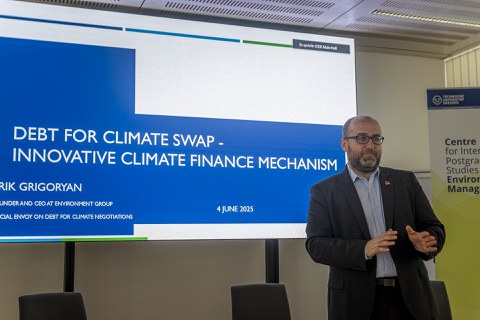
Alumnus Erik Grigoryan, former Armenian Environment Minister, introduces the topic of “Debt-for-Climate Swaps”
Debt-for-climate swaps are financial instruments that allow indebted countries—often in the Global South—to reduce their external debt in exchange for commitments to invest in climate adaptation, biodiversity, and sustainable development. These mechanisms convert financial burdens into environmental opportunities and offer mutual benefits: for debtor countries, a path to resilience and development; for creditor countries, a concrete way to deliver on international commitments such as the Paris Agreement, the Addis Ababa Action Agenda, and the 2030 Agenda for Sustainable Development.
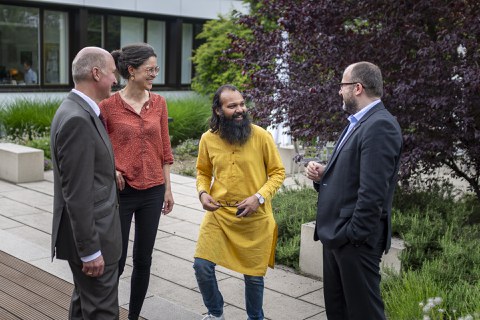
Exchange between the two alumni Erik Grigoryan (left), Vaibhav Aggarwal (2nd from left), moderator Anna Görner (CIPSEM) and Matthias Walz (UNU-FLORES)
Erik Grigoryan, currently Armenia’s Special Envoy on Debt-for-Climate Swap Initiatives and founder of the Environment Group consultancy, shared insights from his extensive experience in environmental policy and international finance. As a graduate of the 30th UNEP/UNESCO/BMU International Postgraduate Course in Environmental Management (EM30), he exemplifies the long-term impact of CIPSEM’s alumni network.
In his keynote, Erik emphasized: “Countries from the Global South have more power than they think—especially when they collaborate regionally.” He urged policymakers to see debt not only as a burden but as a lever for long-term climate investment, declaring: “This is not only about debt restructuring. It's about transforming the paradigm.”
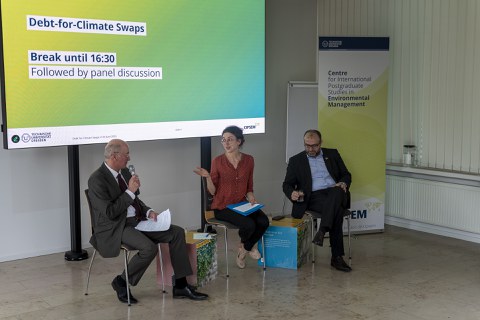
Panel discussion with Dr. Matthias Walz (UNU-FLORES) and Erik Grigoryan (Environment Group), moderated by Dr. Anna Görner (CIPSEM)
In the subsequent panel discussion, Dr. Matthias Walz of UNU-FLORES underlined the relevance of sustainable finance frameworks and highlighted the importance of applying Resource Nexus thinking, ensuring that climate investments foster integrated and equitable management of water, energy, land, and ecosystems. Participants explored practical challenges such as transparency, institutional capacity, and local ownership—key elements for ensuring that debt-for-climate swaps benefit both people and the planet.
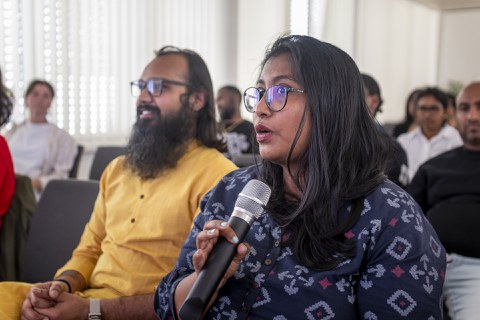
The audience is captivated by the topic and asks many questions.
Moderated by the CIPSEM team, the event embodied CIPSEM’s core mission: fostering global dialogue, capacity building, and cooperation to co-create sustainable futures. Several participants noted how the exchange broadened their perspectives on finance, justice, and development, and sparked ideas for action in their own contexts.
📺 A recording of the session is available on CIPSEM’s YouTube channel.
📸 Special thanks to Victor Smolinski for documenting the event and to IOER for generously hosting the gathering in their conference space.
